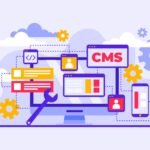When choosing a Content Management System (CMS) for your website, there are certain essential features that you should look for. These features play a crucial role in managing and updating your website efficiently. Here are some key features that every CMS should have:
- Content Editing and Publishing: The CMS should provide a user-friendly interface for creating, editing, and publishing content. Look for a WYSIWYG (What You See Is What You Get) editor that allows non-technical users to format and style content easily. The ability to schedule content for future publication and manage revisions is also important.
- User Management and Permissions: A CMS should have robust user management capabilities. It should allow you to create and manage user accounts with different roles and permissions. This ensures that only authorized individuals can access and modify the website’s content and settings.
- Media Management: Efficient media management is crucial for handling images, videos, and other multimedia content. The CMS should provide an organized media library where you can upload, store, and manage media files. Look for features such as image resizing, thumbnail generation, and the ability to easily embed media into content.
- Template and Theme Management: The CMS should offer a system for managing templates and themes. Templates define the structure and layout of web pages, while themes control the visual appearance. The CMS should allow you to switch between templates or themes easily and customize them according to your branding requirements.
- SEO Optimization: Search Engine Optimization (SEO) is vital for improving your website’s visibility in search engine results. The CMS should offer SEO-friendly features such as customizable meta tags, clean URLs, XML sitemap generation, and the ability to define page titles and descriptions.
- Mobile Responsiveness: With the increasing use of mobile devices, the CMS should support responsive web design. This ensures that your website adapts and displays correctly on various screen sizes and devices. A CMS with built-in mobile responsiveness or the ability to integrate responsive themes is essential.
- Performance and Speed: Website performance is crucial for user experience and search engine rankings. The CMS should generate optimized code and provide caching mechanisms to improve page load times. Look for features such as Gzip compression, image optimization, and browser caching to enhance website speed.
- Security: Website security is paramount. The CMS should have robust security measures to protect your website from vulnerabilities and attacks. Look for features such as user authentication, role-based access control, and the ability to enforce secure password policies. Regular security updates and patches should also be available.
- Analytics and Reporting: The CMS should integrate with analytics tools or provide built-in analytics capabilities. This allows you to track website traffic, user behavior, and other key metrics. Look for features such as integration with Google Analytics or the ability to generate basic reports within the CMS.
- Scalability and Extendability: Consider the CMS’s scalability and extendability. It should be capable of handling a growing amount of content, traffic, and functionality requirements. Look for a CMS that supports plugins, extensions, or modules to add additional features and functionalities as your website evolves.
- Multilingual Support: If you have a multilingual audience or plan to expand globally, the CMS should offer multilingual support. It should allow you to create and manage content in multiple languages, with features such as language switchers and translation management.
- Backup and Restore: Data loss can be catastrophic, so the CMS should provide backup and restore functionality. It should allow you to schedule regular backups of your website’s content and settings. Additionally, the ability to restore previous versions or undo changes is valuable.
- Support and Community: Consider the support options and community surrounding the CMS. Look for documentation, user forums, tutorials, and professional support services to assist you in case of any issues or questions. A strong community ensures continuous development and the availability of plugins and themes.
These essential features form the foundation of a reliable and functional CMS. By assessing each feature against your specific requirements and goals, you can choose a CMS that empowers you to effectively manage and grow your website.





